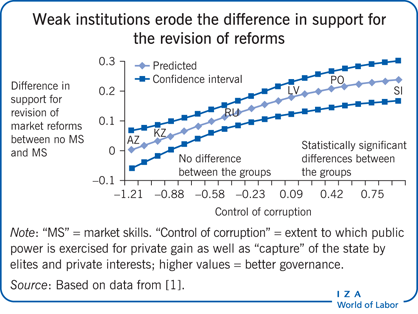Elevator pitch
Economic self-interest and social considerations are the key determinants of public support for market reforms in transition countries. However, political strategies that rely mainly on public support for pushing through economic reforms have limited relevance if the prevailing institutional environment is weak or corrupt. Poor governance and under-developed democracy significantly reduce the level of support. A good institutional framework allows the potential gains from reforms to be realized in a beneficial way, while corruption and poor governance deny the prospect of gains for individuals and for society.
Key findings
Pros
Individual, economic self-interest is the key driver of support for market reforms.
“Market-friendly” institutions increase the support for market reforms.
Attitudes towards market reforms can change from opposition to support if there is a framework of good governance and well-developed democratic institutions.
Public support for market reforms has converged between the Commonwealth of Independent States and the Baltic and Central Europe Countries over time, due to economic growth, less income inequality, and improved governance.
Cons
The prevailing conditions at the time reforms are introduced can increase the degree of political constraints and hinder the development of democratic institutions.
Opposition to reforms is largely defined by concerns about the legitimacy of those reforms.
When market institutions are not developed, public attitudes toward market reforms are generally uniformly negative.
Higher inflation, unemployment, and income inequality increase the opposition to market reforms.
